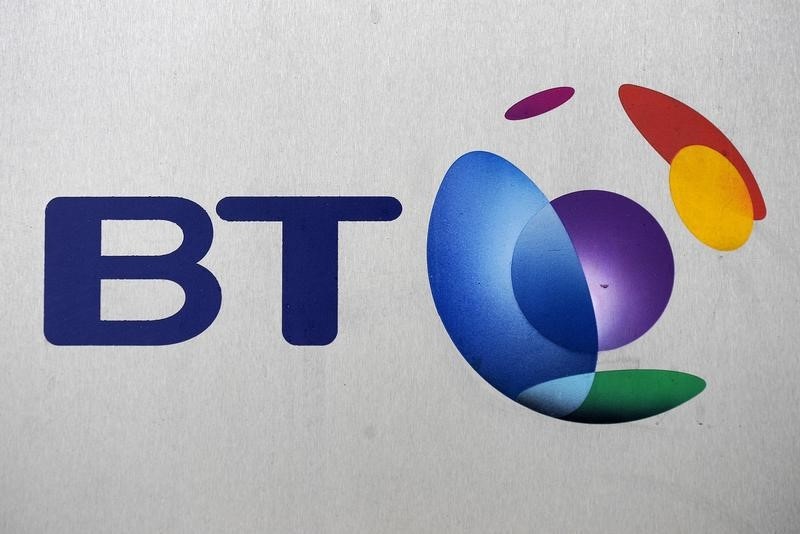By Kate Holton
LONDON (Reuters) - BT's (L:BT) move to buy mobile operator EE is expected to put the former state-owned telecoms giant back in pole position as fixed line and mobile services converge, forcing rivals such as Vodafone (L:VOD) to make costly moves of their own to keep up.
BT on Monday entered into exclusive talks with the owners of EE, Orange (PA:ORAN) and Deutsche Telekom (DE:DTEGn), after playing them off for weeks against rival suitor, Telefonica (MC:TEF), showing the power the 168-year-old fixed-line operator now wields with its vision of providing a unified fixed and mobile broadband Internet service.
With companies looking to offer bundles of mobile and fixed line broadband, telephony and pay-TV services from one provider, BT is seen as best placed to prosper with its planned fixed-mobile services spiced up with exclusive TV content such as Premier League football games.
The EE move also revives BT's rivalry with Vodafone which dates back to when they were the two biggest names in British telecoms until a heavily indebted BT dropped out of the mobile market in 2001.
The prospect of a BT which has since been emboldened by the success of its broadband strategy now jumping into top spot in the mobile market has already caused Vodafone to review its strategic options, including whether it should buy cable operator Liberty Global (O:LBTYA).
Meanwhile Hutchison Whampoa (HK:0013), the owner of Three, the smallest of Britain's four mobile network operators, has been contemplating making a bid for O2 if BT doesn't buy it, sources familiar with the matter have said.
"BT have done a fantastic job in the last five years," a neutral telecoms industry executive said, of a group which was still on its knees in 2008 and 2009 with two major profit warnings.
"Vodafone could have taken its time, over the next three to five years, (to buy or build its own fixed-line network) but with BT buying a mobile business they're going to have to do something pretty quickly now."
The fight is likely to play out not only in the hunt for customers, but also potentially in the push for content and in the offices of the competition regulator, where BT's rivals are seen likely to argue that it is gaining too great an advantage.
"We will follow whatever they (BT) do and the level of aggressiveness in their pricing," Vodafone's chief executive Vittorio Colao told reporters recently.
"If they come harsh on mobile, we will come harsh too."
BETTER TO BUY
But having made it known earlier this year that it was going ahead with its "inside out" strategy of launching a hybrid, fixed-mobile consumer service in 2015 that combines fibre broadband, wi-fi and 4G cellular elements, BT now finds itself spoilt for choice in buying a complete mobile network.
"(It) makes a lot of sense," said investment firm and BT shareholder Woodford Investment.
"Free cash flow prospects should ultimately be far more robust from the enlarged entity, less reliant on price increases and cost rationalisation, with the focus moving to meaningful growth from a cross-selling strategy."
By once again owning both mobile and fixed infrastructure, it will now be able to target those EE customers who do not already take fixed line broadband from BT.
Vodafone has already said it will launch its own consumer broadband and TV service next year, relying in part on its Cable & Wireless fixed line network and, like other rivals, on the BT network to reach customers in their homes.
But breaking into the highly competitive home broadband sector will be tough.
"With (Liberty's) Virgin, BT, Sky (L:SKYB) and TalkTalk (L:TALK) that broadband market is very stitched up and it's going to be very difficult for anybody else to get a toe in the water," the industry executive said.
Vodafone already has a content partnership with Sky (L:SKYB), enabling its mobile customers to access sports and other programming, and this could be extended to be a part of Vodafone's new broadband service.
However, Vodafone's acquisition of cable networks in Spain and Germany has prompted speculation as to whether it should buy also buy a similar asset in Britain.
But media reports in late November that Vodafone was actively looking at a deal to buy Liberty, Europe's leading cable operator with a likely price tag of around $90 billion, sent Vodafone's share price sliding.
"Convergence is going to happen and they've got to be ready for it," one of Vodafone's 15 biggest shareholders told Reuters.

"(But) I think shareholders would really struggle with a Liberty deal. The only realistic option ... is to try and do it organically and that's not a great option either. To me that feels like the only palatable option, the least worst option."
(Additional reporting by Leila Abboud; Editing by Greg Mahlich)